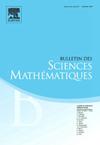通过配点上的正交多项式研究一类 Liouville-Caputo 分数阶 Pennes 生物热流偏微分方程
IF 0.9
3区 数学
Q2 MATHEMATICS, APPLIED
引用次数: 0
摘要
本文系统地讨论了Pennes生物热流型抛物型偏微分方程的广义非局部形式的收敛逼近。这些流动问题经常出现在检查热疗的温度变化时。这里,非局部形式涉及卡普托型分数阶导数。将Pennes生物热流模型的无量纲化形式转化为空间上的半离散连续形式,在时间上采用均匀步长有限差分逼近。然后,用切比雪夫搭配点上的第三类移位切比雪夫多项式(TKSCP)在所有时间水平上逼近这个半离散问题。这个过程将稳态问题转化为一个代数方程组,其解是所提出模型的温度分布。除了预期的理论误差外,还产生了近似解与精确解的一致收敛性。我们还通过计算研究了分数阶导数的阶数对活组织温度分布的影响。图形结果表明,当分数阶参数趋向于正整数时,该广义流动问题保持了与具有整阶偏导数的经典抛物型问题相似的性质。本文章由计算机程序翻译,如有差异,请以英文原文为准。
Investigations of a class of Liouville-Caputo fractional order Pennes bioheat flow partial differential equations through orthogonal polynomials on collocation points
In this study, we give a systematic discussion on convergent approximations of generalized nonlocal form of Pennes bioheat flow type parabolic partial differential equations. These flow problems frequently appear during the examination of the temperature variations in hyperthermia. Here, the nonlocal form involves Caputo-type fractional derivatives. The finite difference approximation in time is used on uniform steps to reduce the nondimensionalized form of the Pennes bioheat flow model into a semi-discrete continuous form in space. Thereafter, this semi-discrete problem is approximated by the third-kind shifted Chebyshev polynomials (TKSCP) on Chebyshev collocation points, at all time levels. This procedure converts the steady-state problem into a system of algebraic equations whose solution is the temperature distribution of the proposed model. In addition to the expected theoretical errors, a uniform convergence of the approximated solution to the exact solution is produced. We also investigated the effect of the order of fractional derivatives on the temperature distribution of living tissues computationally. Graphical results demonstrate that this generalized flow problem maintains a behavior similar to that of classical parabolic problems having integer-order partial derivatives when the fractional parameters tend to a positive integer.
求助全文
通过发布文献求助,成功后即可免费获取论文全文。
去求助
来源期刊
CiteScore
1.90
自引率
7.70%
发文量
71
审稿时长
6-12 weeks
期刊介绍:
Founded in 1870, by Gaston Darboux, the Bulletin publishes original articles covering all branches of pure mathematics.

 求助内容:
求助内容: 应助结果提醒方式:
应助结果提醒方式:


